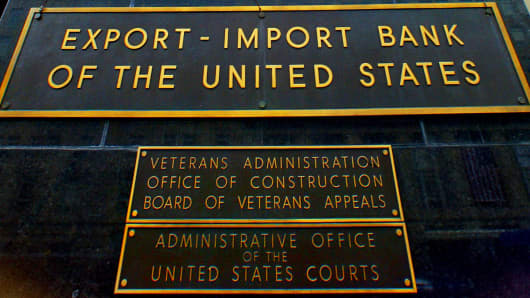Given that exports have fallen by 8 percent in the first quarter and our GDP has been revised downward, can we really afford to make things worse? Closing the Ex-Im Bank will ultimately kill over one million U.S. jobs over the next four to five years and would make America less competitive.
Read MoreGOP: Just say no to the Export-Import Bank
A little history lesson may be in order. In 1934, with our country in the midst of an unprecedented economic depression, President Franklin Delano Roosevelt recognized that the government could — and should — take action to spur job creation, facilitate export growth and stimulate small business transactions. He did so by establishing the Export-Import Bank, which provides government backed loans as well as offers guarantees and insurance to help sell US goods around the world if the commercial market is unable or unwilling to provide such loans. The concept of initiating a system for providing foreign trade credits was a crucial part of increasing economic growth after extended market downturns.
Fast forward 75 years to 2009. President Obama took office and inherited an economy cratering towards a second great depression. Recognizing the need to support job growth the president launched the National Export Initiative, an ambitious plan to double exports by 2015 to support 2 million U.S. jobs. When the Ex-Im Bank lends money to a foreign buyer of American-made goods or services, the foreign company is encouraged to make a purchase it otherwise may not have done. In turn, the American producer gets an order that directly increases revenue, allowing the company to theoretically expand its operations and hire more workers. In the last five years, the Ex-Im Bank met the challenge of supporting U.S. jobs and has collectively sustained and created an estimated 1.2 million salaried positions. In addition, bank lending increased to $36 billion from $14 billion in the same period. With the fees and interest charged to borrowers, the Ex-Im Bank is self-sustaining and sent over $1 billion to the U.S. Treasury in 2013. These fees provide for appropriate loan-loss reserves and help reduce our unsustainable deficit.
Read MoreDon't count out the Export-Import Bank—yet
Bank critics maintain that Ex-Im fosters corporate cronyism because large American companies, such as Boeing, Dow Chemical, GE, and others frequently utilize Ex-Im financing for large transactions. However, the real impact comes from its support to small and medium size enterprises that do not wield significant power and influence; considering that nearly 90 percent of all Ex-Im authorizations directly support small and medium enterprises. Others contend that U.S. companies, which receive credit on "soft" terms rather than on the basis of "hard" market criteria, possess an unfair advantage when selling goods and services in an intensely competitive global marketplace. Meanwhile, nearly 60 other export credit agencies like Ex-Im Bank around the world assist foreign companies in securing export credit financing. Many of these agencies are much more aggressive in using programs to support their businesses in the marketplace. If the Ex-Im Bank were to close, the U.S. would be the ONLY member in the G8 group that does not have an export credit agency.
Export credit policies ensure a level playing field for American companies in an increasingly competitive global marketplace. While the U.S. is developing international trade-finance agreements that will require all countries to play by the same rules, we're not there yet. The Ex-Im reauthorization is especially important for America's small businesses trying to compete internationally because they face greater export challenges than ever. Last year alone, the Bank supported 3,400 transactions totaling over $5 billion in loans to small businesses. For instance, Specalloy Corporation, a recyclable material wholesaler, received a working capital guarantee loan from the Ex-Im Bank in 2013. That led to an expected $40 million in export sales and created over a dozen new jobs.
Read MoreUS-Africa trade faces Ex-Im risk: GE's Jeff Immelt
To be clear: without Ex-Im support, U.S. firms are at a competitive disadvantage with international companies financed by their respective countries' export credit financing agencies.
During the last reauthorization, Congress enacted a number of reforms designed to increase transparency, accountability, and risk management policies. The Bank has implemented the changes Congress legislated and continues to improve its underwriting and risk management practices. A government agency that increases U.S. jobs, pays for itself, and earns money for the Treasury is surely worthy of strong bipartisan support. That's an economic accomplishment all Americans should be proud of.


